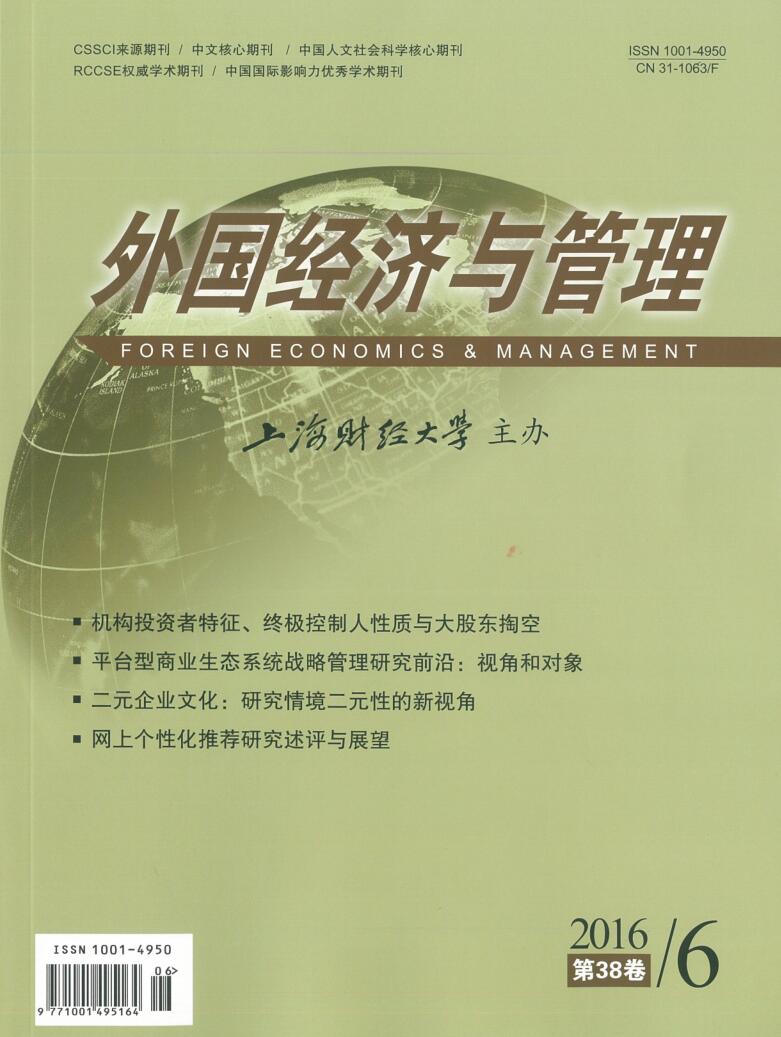"金钱启动"是一种心理学实验研究范式,是指通过给予个体有关金钱的提示或暗示,来激活个体关于金钱的想法,进而研究个体的行为决策所受到的影响。金钱启动可以分为金钱概念启动、金钱富足感启动和金钱剥夺感启动等。在人们的日常消费活动中,很多情境线索能起到金钱启动的作用。研究表明,金钱概念启动会增加实用性消费,金钱富足感启动会增加独特性消费,金钱剥夺感启动会增加补偿性消费。本文运用心理定势理论、调节定向理论和解释水平理论,解释了金钱启动导致消费者做出理性或者非理性行为决策的心理机制,探讨了该领域研究的实践启示意义,并对未来研究方向进行了展望。
“金钱启动”让人理性还是非理性?——金钱启动与消费者行为决策
摘要
参考文献
1 (美)凡勃伦著,蔡受百译. 有闲阶级论——关于制度的经济研究[M]. 北京:商务印书馆,1964:21-29,54-75,123-137.
2 郭晓琳,林德荣. 中国本土消费者的面子意识与消费行为研究述评[J]. 外国经济与管理,2015,(11):63-71.
3 李爱梅,李伏岭. 悲伤消费效应研究综述[J]. 外国经济与管理,2013,(9):44-51,60.
4 李爱梅,彭元,李斌,等. 金钱概念启动对亲社会行为的影响及其决策机制[J]. 心理科学进展,2014,(5):845-856.
5 刘飞. 炫耀性消费——凡勃伦与布迪厄之比较[J]. 消费经济,2005,(3):52-54.
6 田阳,王海忠,柳武妹,等. 品牌承诺能抵御负面信息吗?——自我调节导向的调节作用[J]. 心理学报,2014,(6):864-875.
7 谢天,周静,俞国良. 金钱启动研究的理论与方法[J]. 心理科学进展,2012,(6):918-925.
8 赵建彬. 金钱概念对消费者独特性需求的影响研究[J]. 心理科学,2014,(6):1461-1466.
9 Aarts H,Dijksterhuis A. The silence of the library:Environment,situational norm,and social behavior[J]. Journal of Personality and Social Psychology,2003,84(1):18-28.
10 Belk R. Possessions and self[M]. Baffins Lane,Chichester,West Sussex:John Wiley & Sons,Ltd,1988.
11 Berry C J. The idea of luxury:A conceptual and historical investigation[M]. Cambridge:Cambridge University Press,1994.
12 Boucher H C,Kofos M N.The idea of money counteracts ego depletion effects[J]. Journal of Experimental Social Psychology,2012,48(4):804-810.
13 Charles K K,Hurst E,Roussanov N. Conspicuous consumption and race[R]. NBER Working Paper No. 13392,2007.
14 Chartrand T L,Huber J,Shiv B,et al. Nonconscious goals and consumer choice[J]. Journal of Consumer Research,2008,35(2):189-201.
15 Chernev A. Goal orientation and consumer preference for the status quo[J]. Journal of Consumer Research,2004,31(3):557-565.
16 Cryder C E,Lerner J S,Gross J J,et al. Misery is not miserly:Sad and self-focused individuals spend more[J]. Psychological Science,2008,19(6):525-530.
17 Cutright K M,Bettman J R,Fitzsimons G J. Putting brands in their place:How a lack of control keeps brands contained[J]. Journal of Marketing Research,2013,50(3):365-377.
18 Dhar R,Wertenbroch K. Consumer choice between hedonic and utilitarian goods[J]. Journal of Marketing Research,2000,37(1):60-71.
19 Fujita K,Trope Y,Liberman N,et al. Construal levels and self-control[J]. Journal of Personality and Social Psychology,2006,90(3):351-367.
20 Gino F,Pierce L. The abundance effect:Unethical behavior in the presence of wealth[J]. Organizational Behavior and Human Decision Processes,2009,109(2):142-155.
21 Grønmo S. Compensatory consumer behavior:Elements of a critical sociology of consumption[A]. Otnes P(Ed.). The sociology of consumption[C]. Atlantic Highlands,NJ:Humanities Press International,1988:65-85.
22 Hamilton R. Decisions at a distance:Effects of psychological distance on consumer decision making[J]. Journal of Consumer Research,2014,41(2):3-6.
23 Hansen J,Kutzner F,Wänke M. Money and thinking:Reminders of money trigger abstract construal and shape consumer judgments[J]. Journal of Consumer Research,2013,39(6):1154-1166.
24 Khan U,Dhar R.Where there is a way,is there a will? The effect of future choices on self-control[J]. Journal of Experimental Psychology:General,2007,136(2):277-288.
25 Kim S,Rucker D D. Bracing for the psychological storm:Proactive versus reactive compensatory consumption[J]. Journal of Consumer Research,2012,39(4):815-830.
26 Ledgerwood A,Trope Y,Chaiken S. Flexibility now,consistency later:Psychological distance and construal shape evaluative responding[J]. Journal of Personality and Social Psychology,2010,99(1):32-51.
27 Leibenstein H. Bandwagon,snob,and Veblen effects in the theory of consumers' demand[J]. The Quarterly Journal of Economics,1950,64(2):183-207.
28 Liberman N,Förster J. Distancing from experienced self:How global-versus-local perception affects estimation of psychological distance[J]. Journal of Personality and Social Psychology,2009,97(2):203-216.
29 Liberman N,Sagristano M D,Trope Y. The effect of temporal distance on level of mental construal[J]. Journal of Experimental Social Psychology,2002,38(6):523-534.
30 Liu J E,Vohs K D,Smeesters D. Money and mimicry:When being mimicked makes people feel threatened[J]. Psychological Science,2011,22(9):1150-1151.
31 Liu J,Smeesters D,Vohs K D. RETRACTED:Reminders of money elicit feelings of threat and reactance in response to social influence[J]. Journal of Consumer Research,2012,38(6):1030-1046.
32 Liu W,Aaker J. The happiness of giving:The time-ask effect[J]. Journal of Consumer Research,2008,35(3):543-557.
33 Mandel N,Johnson E J. When web pages influence choice:Effects of visual primes on experts and novices[J]. Journal of Consumer Research,2002,29(2):235-245.
34 Mogilner C,Aaker J. "The time vs. money effect":Shifting product attitudes and decisions through personal connection[J]. Journal of Consumer Research,2009,36(2):277-291.
35 Nussbaum S,Trope Y,Liberman N. Creeping dispositionism:The temporal dynamics of behavior prediction[J]. Journal of Personality and Social Psychology,2003,84(3):485-497.
36 Quoidbach J,Dunn E W,Petrides K V,et al. Money giveth,money taketh away:The dual effect of wealth on happiness[J]. Psychological Science,2010,21(6):759-763.
37 Pham M T,Higgins E T. Promotion and prevention in consumer decision making:The state of the art and theoretical propositions[A]. Ratneshwar S,Mick D G(Eds.). Inside consumption:Frontiers of research on consumer motives,goals,and desires[C]. London:Routledge,2005.
38 Rucker D D,Galinsky A D. Conspicuous consumption versus utilitarian ideals:How different levels of power shape consumer behavior[J]. Journal of Experimental Social Psychology,2009,45(3):549-555.
39 Rucker D D,Galinsky A D. Desire to acquire:Powerlessness and compensatory consumption[J]. Journal of Consumer Research,2008,35(2):257-267.
40 Rucker D D,Galinsky A D,Dubois D. Power and consumer behavior:How power shapes who and what consumers value[J]. Journal of Consumer Psychology,2012,22(3):352-368.
41 Sharma E,Alter A L. Financial deprivation prompts consumers to seek scarce goods[J]. Journal of Consumer Research,2012,39(3):545-560.
42 Tesser A. On the plasticity of self-defense[J]. Current Directions in Psychological Science,2001,10(2):66-69.
43 Tian K T,Bearden W O,Hunter G L. Consumers' need for uniqueness:Scale development and validation[J]. Journal of Consumer Research,2001,28(1):50-66.
44 Tong L Q,Zheng Y H,Zhao P. Is money really the root of all evil? The impact of priming money on consumer choice[J]. Marketing Letters,2013,24(2):119-129.
45 Trope Y,Liberman N. Temporal construal and time-dependent changes in preference[J]. Journal of Personality and Social Psychology,2000,79(6):876-889.
46 Trope Y,Liberman N,Wakslak C. Construal levels and psychological distance:Effects on representation,prediction,evaluation,and behavior[J]. Journal of Consumer Psychology,2007,17(2):83-95.
47 Vohs K D,Mead N L,Goode M R. The psychological consequences of money[J]. Science,2006,314(5802):1154-1156.
48 Zhou RR,Pham M T. Promotion and prevention across mental accounts:When financial products dictate consumers & investment goals[J]. Journal of Consumer Research,2004,31(1):125-135.
49 Zhou X Y,Vohs K D,Baumeister R F.The symbolic power of money:Reminders of money alter social distress and physical pain[J]. Psychological Science,2009,20(6):700-706.
引用本文
李爱梅, 罗莹, 李斌. “金钱启动”让人理性还是非理性?——金钱启动与消费者行为决策[J]. 外国经济与管理, 2016, 38(6): 100–112.
导出参考文献,格式为:
上一篇:网上个性化推荐研究述评与展望






 8929
8929  10387
10387

